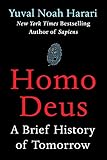André Nesse
Sapiens
A Brief History of Humankind
Hardcover
André Nesses eksemplar av Sapiens - A Brief History of Humankind
Lesetilstand
Ingen lesetilstand
Hylle
NonfictionLesedato
Ingen lesedato
Favoritt
Ingen favoritt
Terningkast
Ingen terningkast
Min omtale
Ingen omtale
Bokdetaljer
Format Hardcover
ISBN13 9781846558238
Språk Engelsk
Finn boka på biblioteket
Finner du ikke ditt favorittbibliotek på lista? Send oss e-post til admin@bokelskere.no med navn på biblioteket og fylket det ligger i. Kanskje vi kan legge det til!
Bokelskeres terningkastfordeling
25 19 4 5 0 0Bokomtaler
Svært god bok om menneskenes historie. Bør leses!
Fremragende fremstilling om det vise menneskets historie. Fremstillingen bygger på kjente teorier og etablerte fakta. Det er perspektivet på mennesket som en av mange dyrearter og sammenstillingen av fakta og teorier, som etter min oppfatning gjør at boken skiller seg ut og blir interessant. Jeg sitter igjen med følelsen av at det er våre sosiale egenskaper og en rekke tilfeldigheter som gjør at vi har den posisjonen som vi har i dag. Kanskje vi burde være mer ydmyke?
Skriv en omtale Se alle omtaler av verket
Diskusjoner om boka
Ingen diskusjoner ennå.
Start en diskusjon om verket Se alle diskusjoner om verketSitater fra dette verket
Just as medieval culture did not manage to square chivalry with Christianity, so the modern world fails to square liberty with equality. But this is no defect. Such contradictions are an inseparable part of every human culture. In fact, they are culture's engines, responsible for the creativity and dynamism of our species. Just as when two clashing notes played together force a piece of music forward, so discord in our thoughts, ideas and values compel us to think, re-evaluate and criticise. Consistency is the playground of a dull mind.
A meaningful life can be extremely satisfying even in the midst of hardship, whereas a meaningless life is a terrible ordeal no matter how comfortable it is.
The economic pie of 2014 is far larger than the pie of 1500, but it is distributed so unevenly that many African peasants and Indonesian labourers return home after a hard day's work with less food than did their ancestors 500 years ago. Much like the Agricultural Revolution, so too the growth of the modern economy might turn out to be a colossal fraud. The human species and the global economy may well keep growing, but many more individuals may live in hunger and want.
So, monotheism explains order, but is mystified by evil. Dualism explains evil, but is puzzled by order. There is one logical way of solving the riddle: to argue that there is a single omnipotent God who created the entire universe - and He's evil. But nobody in history hs had the stomach for such a belief.
Modern-day science is a unique tradition of knowledge, inasmuch as it openly admits collective ignorance regarding the most important questions. Darwin never argued that he was "the Seal of the Biologists", and that he had solved the riddle of life once and for all. After centuries of extencive scientific research, biologists admit that they still don't have any good explanation for how brains produce conciousness. Physicists admit that they don't know what caused the Big Bang, or how to reconcile quantum mechanics with the theory of general relativity.
Monotheists have to practise intellectual gymnastics to explain how an all-knowing, all-powerful, and perfectly good God allows so mush suffering in the world.
Consistency is the playground of dull minds.
Some religions, such as Christianity and Nazism, has killed millions out of burning hatred. Capitalism has killed millions out of cold indifference coupled with greed.
Is there anything more dangerous than dissatisfied and irresponsible gods who don't know what they want?
Romans killed no more than a few thousand Christians. In contrast, over the course of the next 1500 years, Christians slaughtered Christians by the millions to defend slightly different interpretations of the religion of love and compassion.
Legg inn et nytt sitat Se alle sitater fra verket
Lister som inneholder dette verket
Bøker om psykologien rundt miljø og klimaendringer. Noen veldig direkte miljø-psykologi, andre mindre direkte, men fortsatte relevante for hvordan vi tenker rundt klima.











































































